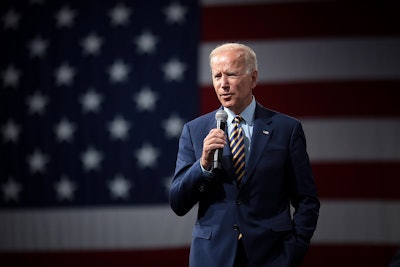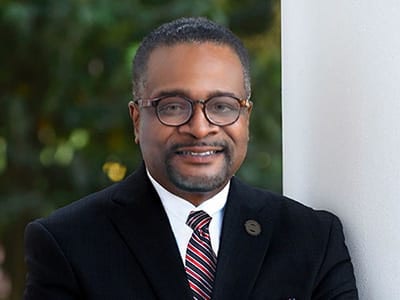Higher education, for better or worse, has largely remained in the same place it was four years ago when the country had eagerly awaited the results of the 2016 election. There has been no reauthorization of the Higher Education Act, now six years overdue. Free community college, a popular topic of conversation in the 2016 election and again in the primaries leading up to the 2020 election, lost steam. Pell Grants have remained flat.
 President-elect Joe Biden
President-elect Joe BidenBut the 2020 election season has brought higher education — and, in particular, historically Black colleges and universities (HBCUs) — back to the forefront of the conversation. Recognizing how critically important these institutions and their students and alumni are to the Democratic base, President-elect Joe Biden unveiled a $70 billion plan to support HBCUs. The plan focuses primarily on investing in infrastructure and research capacity for the institutions, but it also promises expansion to the federal Pell Grant program and broad student debt relief.
HBCUs in the Spotlight
Dr. Tashni-Ann Dubroy, executive vice president and chief operating officer at Howard University, says while she is excited to have one of the school’s alumni ascend to the second highest seat in the land, the community should manage its expectations for what the Biden-Harris administration will be able to do.
“I don’t think we should set unreasonable expectations for VP Harris to solve
 Dr. Tashni-Ann Dubroy
Dr. Tashni-Ann Dubroyall HBCU issues,” says Dubroy. “What I do hope for is, now that we have a champion in the White House who understands how important HBCUs are, I don’t anticipate that we will be having conversations about relevance or what … an HBCU is before they can even get to relevance.”
Still, addressing HBCU issues would help students of color and students from low-income backgrounds across higher ed. For instance, Lodriguez Murray, the United Negro College Fund’s senior vice president for public policy and government affairs, says the organization is hoping to see Pell Grant awards double in the next administration.
“It’s time to restore the purchasing power of the Pell Grant, especially during the time of this global pandemic that disproportionately impacts African Americans, and there needs to be some kind of recognition for the pervasive racism that has existed in this country for centuries,” he says.
Three in four HBCU students receive the Pell Grant, and 81% take out student loans, according to Murray, compared to one in four students overall receiving the Pell Grant and 70% taking out loans. Today, the maximum Pell Grant award is $6,345 per year, compared to a national average in-state tuition of $10,440 and out-of-state tuition of $27,640.
Clark Atlanta University President Dr. George T. French Jr. says he is hopeful
 Dr. George T. French Jr.
Dr. George T. French Jr.there will be a greater investment in higher education in general as a necessary partner in advancing the national security initiatives of our country under a Biden administration. And, since the country has elected a vice president who is not only the first woman, person of color and HBCU graduate, but someone “who we don’t doubt whether or not they’re elitist or question the value proposition of HBCUs,” French says he expects this administration to recognize the role of HBCUs in advancing the national priorities.
Dubroy agreed, and says she hopes having a public college grad and an HBCU alumna as president and vice president, respectively, ensures conversations about higher education — particularly about partnerships and funding opportunities — expand outward from the traditionally elitist focus on Ivy League and Research 1 universities. More than anything, she thinks Biden’s victory should give more institutions an “essential seat at the table” and “HBCUs will be front and center and help them accomplish their vision and goals for the nation.”
“For institutions that have been largely teaching institutions, but may have the faculty and some resources to elevate to research institutions, the federal government should provide some funding to provide them capacity building grants,” French says.
He believes the devaluing of research and divestment from higher education at the federal and state levels over the last decade has led to the country falling drastically behind in higher education and scientific discovery, leaving much ground to cover in the race for global competitiveness.
“We’re talking about everyday scientific discoveries that include the defense of our nation as well as the convenience of how we live within our households,” French says.
But Murray says his greatest expectation of Biden is that the President-elect will “use the bully pulpit of the presidency” to bring real recognition to HBCUs, their students and issues. “We are now accustomed to a new level of exposure,” says Murray, adding that HBCUs will no longer accept only being part of the conversation at election time.
Community colleges and workforce development
Like HBCUs and minority-serving institutions in general, community colleges also disproportionately serve students from low-income backgrounds, including those who may be looking for stronger leverage in the workforce. As such, Pell Grant funding increases are also incredibly important to this group of institutions.
According to David Baime, senior vice president for government relations and
 David Baime
David Baimepolicy analysis for the American Association of Community Colleges (AACC), there is an additional need to revamp eligibility requirements — particularly the rules around the required number of credit hours — for community college students, in addition to increasing the Pell Grant’s purchasing power. Many community college students attend part-time while balancing work or familial obligations, but at present, Pell Grants are only eligible to students who are enrolled full-time.
“Community colleges are the on-ramp to higher education for many Americans,” says Dr. Walter Bumphus, AACC’s president and CEO. “Community colleges need to be funded in a way that allows them to provide needed programs and services to ensure student success for all students.”
As vice president, Joe Biden was instrumental in the Obama Administration’s push for free community college, and with America’s next First Lady being a community college faculty member herself, President-elect Biden is expected to continue to push this priority once he assumes office. While campaigning, the Biden team outlined a $50 billion investment in community colleges, including increased investment in workforce training, including community college-business partnerships and apprenticeships as well as infrastructure improvements. The plan calls for a first-dollar grant program to help students cover costs associated with cost of living, and it incentivizes collaboration with community organizations to provide wraparound services for students needing extra support. These initiatives are key to promoting more equitable access and outcomes for all students, which Bumphus says is another priority for AACC moving forward.
Baime says the higher ed community, and especially those at community colleges, are also counting on the president-elect to work with Congress to get a resolution on Deferred Action for Childhood Arrivals (DACA) and the Development, Relief, and Education for Alien Minors Act to allay concerns for international students caused by the previous administration.
All eyes on Georgia
Both Baime and Murray acknowledged the importance of election outcomes in the House and Senate in advancing any meaningful policy reform for higher education. Baime is hopeful, for example, that the 117th Congress will prioritize reauthorizing the Higher Education Act, which expired in 2013.
According to the American Council on Education, the next higher ed bill will likely address affordability and college costs; access, persistence and completion; better information for consumers; student loan programs; accreditation and oversight; innovation; campus safety; and the burden of federal regulations.
 Lodriguez Murray
Lodriguez MurrayDemocrats lost several seats in the U.S. House of Representatives but have managed to hold onto the majority, with several districts in tight run-off races. In the Senate, two Georgia races are headed for a January run-off, which will determine whether Republicans hold the majority.
If Republicans do not win the majority, this could mean Vice President Harris, who will also serve as the President of the Senate in the official capacity as VP, will hold the tie-breaker vote in the event of any stalemates in the chamber. And, if Morehouse College alumnus and Ebenezer Baptist Church senior pastor Reverend Dr. Raphael Warnock edges out Republican incumbent Sen. Kelly Loeffler, this would potentially add another champion for HBCUs to the chamber.
“If the Democrats re-take the Senate, even if they don’t eliminate the filibuster, they would have the ability to pass a reconciliation bill” which could have several policy implications for higher education, says Murray.
Also up for grabs, he says, are both the Chair and Ranking Member seats on the Senate Committee on Health, Labor, Education, and Pensions, and those individuals will also play a large role in the future of any higher education policy and funding directives.















